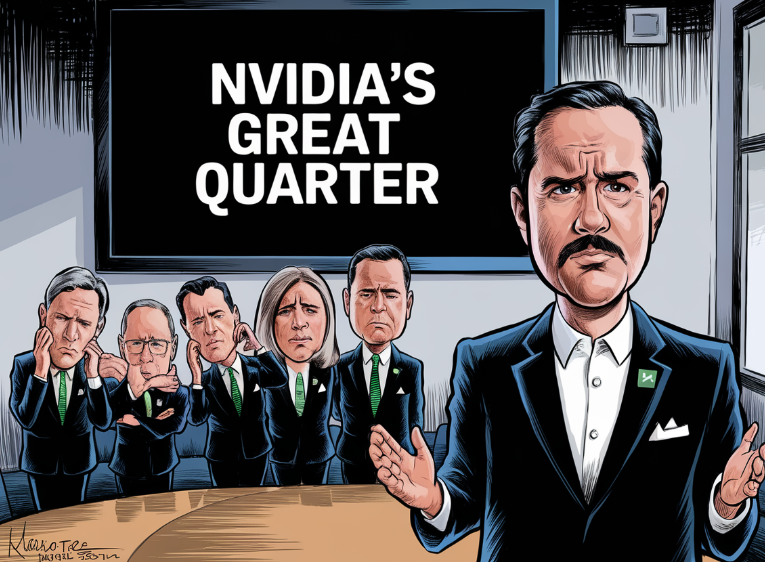News
Nvidia Shares Drop Despite Stellar Q2 Earnings

Nvidia has once again proven its dominance in the tech world with a second-quarter performance that exceeded expectations. The company reported a 122% increase in revenue year-over-year, with its data center division leading the charge with a 154% growth rate. Surprisingly, the chipmaker’s earnings report has become an event in its own right, drawing comparisons to key economic indicators like the U.S. unemployment report.
But despite these impressive numbers, Nvidia shares dropped by 7% in after-hours trading. For investors, the question looms: why would a company with such strong performance see its stock value fall?
Unmet Market Expectations amid Production Delays
One of the primary reasons behind the drop in Nvidia shares is the market’s extraordinarily high expectations. As Matt Britzman, senior equity analyst at Hargreaves Lansdown, pointed out, “It’s less about just beating estimates now… it’s the scale of the beat today that looks to have disappointed a touch.” In other words, while Nvidia’s performance was outstanding, it didn’t surpass expectations by a wide enough margin to satisfy investors. Moreover, Nvidia’s staggering market cap of nearly $2.9 trillion has led some investors to question how much further the stock can rise. With a valuation this high, the room for growth may be limited, prompting a more cautious approach among investors.
It didn’t help that the company reported production delays for it’s next-generation Blackwell chip. Although current AI chips are performing well, delays in the release of new technology can cause concern, especially when the market is as competitive as the AI industry.
A Snapshot of Nvidia’s Performance in 2024
Nvidia's stock has had an extraordinary journey throughout 2024, reflecting its dominance in the AI and semiconductor sectors. At the start of the year, Nvidia shares were trading at around $150 per share. However, as the company continued to exceed earnings expectations and solidify its position as a leader in AI technology, the stock surged to new heights.
By mid-2024, Nvidia's stock price had nearly doubled, reaching a peak of approximately $480 per share in July, representing a year-to-date increase of over 220%. This surge was driven by strong earnings reports, particularly from its data center and gaming segments, which saw significant growth due to the increased adoption of AI technologies.
However, the latter half of 2024 has been more volatile. Following the announcement of production delays for the upcoming Blackwell chip and concerns over market saturation, Nvidia’s stock experienced a sharp pullback. In August, after the company's Q2 earnings report, the stock dropped by 7% in after-hours trading, bringing the price down to around $450 per share. Despite this decline, Nvidia’s stock remained up by over 200% for the year, making it one of the best-performing stocks in the tech sector.
The high expectations set earlier in the year, along with the company's brief stint as the world’s most valuable company by market cap, have made it challenging for Nvidia to maintain the same level of investor enthusiasm. Nonetheless, Nvidia's 2024 performance highlights both the opportunities and challenges of leading a rapidly evolving industry.
A Sudden Rise to the Top
Nvidia’s meteoric rise to briefly become the world’s most valuable company by market cap is a testament to its leadership in AI technology. For a brief period, Nvidia vaulted over prestigious blue-chip companies like Apple and Intel, a feat that underscores the immense value the market places on AI and its potential.
This was driven by Nvidia’s first-mover advantage in AI chips and its extensive software ecosystem, which has become integral to many industries. The company’s ability to innovate and capture market share in the rapidly growing AI sector propelled its market cap to new heights, surpassing even tech giants that have long dominated the industry.
However, being at the top comes with its own set of challenges. High expectations, coupled with the immense pressure to continuously outperform, mean that any perceived slowdown or issue, such as the Blackwell chip delays, can have an outsized impact on stock performance. Investors may be reacting to the notion that Nvidia’s growth, while still strong, might be entering a phase of moderation, especially compared to the explosive gains seen in previous quarters.
Nvidia Shares: Now What?
Despite the recent dip, Nvidia remains a powerful force in the AI industry. The company’s robust financials, continued innovation, and leadership in AI technology suggest that Nvidia shares may recover as the company addresses production challenges and continues to drive the AI revolution.
However, investors should be aware that the high expectations surrounding Nvidia mean that even small setbacks or perceived underperformance could lead to further volatility in the stock. As always, staying informed and understanding the broader market context will be key to making sound investment decisions.
Did you hold on to your Nvida stock? Or have you given up in favor of more valuable investments? Tell us what you think about the company’s performance this year.



